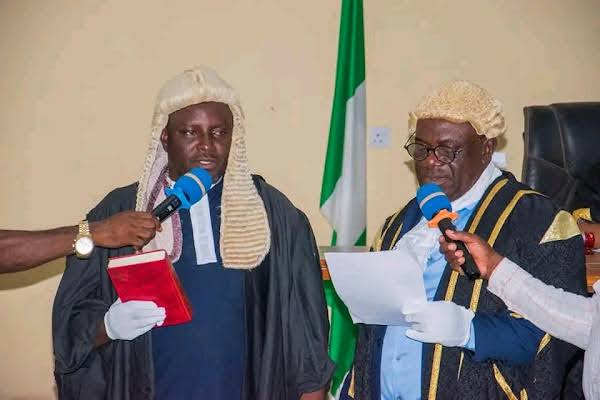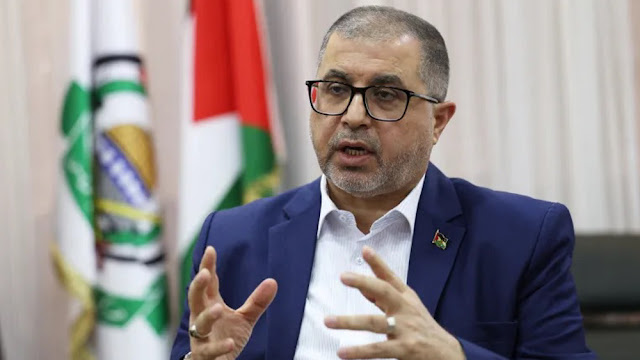MAKURDI, Nigeria – August 25, 2025 – The Benue State House of Assembly has been thrust into a whirlwind of political upheaval following the sudden resignation of Speaker Hon. Aondona Dajoh on Sunday, August 24, 2025, just 48 hours after he presided over the controversial suspension of four lawmakers accused of plotting to unseat him. In a dramatic turn of events, the Assembly swiftly convened an emergency plenary session and elected Hon. Alfred Emberger, one of the previously suspended lawmakers, as the new Speaker. Emberger, representing Makurdi North Constituency, pledged to lead with inclusiveness, fairness, and respect for the principle of separation of powers, signaling a new chapter for the embattled legislative body. This report delves into the details of Dajoh’s resignation, Emberger’s election, the underlying tensions, and the broader implications for governance and stability in Benue State.
A Shocking Resignation: Dajoh Steps Down
The resignation of Hon. Aondona Dajoh, the Speaker of the 10th Benue State House of Assembly, sent shockwaves through the state’s political landscape. Representing Gboko West State Constituency, Dajoh announced his decision in a handwritten letter addressed to the Clerk of the Assembly, dated August 24, 2025. The letter, shared on his social media handle with the caption “Let there be peace,” read: “I write to resign my position as the Speaker, Benue State House of Assembly, effective today, August 24, 2025. This is done in good faith and in the best interest of the state. I want to appreciate my dear colleagues for the opportunity they gave me to be the first among equals. I pledge to remain committed to my duties as a legislator and representative of Gboko West State Constituency.”
Dajoh’s decision came amid heightened tensions within the Assembly, sparked by a controversial plenary session on Friday, August 22, 2025, during which four lawmakers—Hon. Alfred Berger (APC/Makurdi North), Hon. Shimawua Emmanuel (APC/Tiev), Hon. Cyril Ikong (APC/Oju II), and Hon. Abu Umoru (PDP/Apa)—were suspended for six months. The suspensions, initiated by Majority Leader Hon. Saater Tiseer (APC/Mbagwa), were based on allegations that the quartet had attempted to destabilize the Assembly by rallying colleagues to impeach Dajoh. The motion, seconded by Hon. Elias Audu (APC/Gwer East), accused the lawmakers of engaging in “dishonourable actions” capable of causing acrimony and casting aspersions on the House.
The suspensions marked a significant escalation in the Assembly’s internal conflicts, which had been simmering for months. Political observers noted that the Assembly had been grappling with factionalism, with some lawmakers reportedly frustrated by Dajoh’s leadership style and his alignment with Governor Hyacinth Alia’s administration. The vote of confidence passed in support of Dajoh and Alia just weeks earlier had failed to quell these tensions, culminating in the events leading to his resignation.
Dajoh’s decision to step down was framed as a selfless act to restore peace and stability to the Assembly. His Chief Press Secretary, Terver Zamber, stated that he was still verifying the circumstances surrounding the resignation, suggesting that the move may have been influenced by intense pressure from within the Assembly or external political forces. Political analyst Dr. Joseph Anzaku, a lecturer at Benue State University, suggested that Dajoh’s resignation may have been a strategic retreat to avoid a formal impeachment process. “The Speaker likely saw the writing on the wall,” Anzaku said. “By resigning voluntarily, he preserved his dignity and avoided a public showdown that could have further destabilized the Assembly.”
A Swift Transition: Emberger’s Election
Hours after Dajoh’s resignation, the Benue State House of Assembly convened an emergency plenary session on Sunday, August 24, 2025, to address the leadership vacuum. The session, presided over by Deputy Speaker Hon. Lami Danaldi-Ogenyi, marked a turning point in the crisis. In a surprising development, the House unanimously voted to lift the suspensions of the four lawmakers, including Hon. Alfred Emberger (referred to as Berger in some sources), who had been accused of plotting against Dajoh. The motion to reinstate the lawmakers was moved by Majority Leader Hon. Saater Tiseer and seconded by Hon. Samuel Jiji of Logo State Constituency, reflecting a concerted effort to restore unity within the chamber.
With the suspensions lifted, the Assembly proceeded to elect a new Speaker. Hon. Douglas Akyaa (APC/Makurdi South) nominated Hon. Alfred Emberger for the position, with Hon. Abu Umoru (PDP/Apa) seconding the motion. The absence of opposing nominations underscored the swift consensus among lawmakers, possibly driven by a desire to stabilize the Assembly and move past the recent turmoil. Clerk of the House John Hwande administered the oath of office, formally installing Emberger as the new Speaker.
In his acceptance speech, Emberger struck a conciliatory tone, praising his predecessor’s contributions and pledging to lead with inclusiveness and fairness. “I acknowledge the weight of this office and the expectations of our people, who look up to us to provide sound laws, effective oversight, and quality representation,” he said. “I wish to sincerely appreciate my predecessor, Rt. Hon. Aondona Dajoh, for his service and commitment to the progress of this House and the people of Benue State. His decision to resign, though difficult, reflects his courage and respect for the institution of the legislature.”
Emberger outlined a vision for his tenure, emphasizing collaboration with other arms of government while maintaining legislative independence. “To my esteemed colleagues, I assure you that this leadership will be anchored on inclusiveness, fairness, and respect for diverse opinions,” he declared. “This House under my watch will work harmoniously with the executive and judiciary while maintaining our independence in line with the principle of separation of powers.” He also pledged to stabilize the House, heal past divisions, and work closely with Governor Hyacinth Alia to deliver on the legislative mandate for Benue State’s development.
The Context: A House Divided
The events leading to Dajoh’s resignation and Emberger’s election reflect deeper divisions within the Benue State House of Assembly. The suspensions on Friday, August 22, 2025, were a flashpoint in a broader power struggle that has been brewing for months. Sources within the Assembly suggest that the four suspended lawmakers, led by Emberger, had been mobilizing support for Dajoh’s impeachment due to disagreements over legislative priorities, committee assignments, and the Speaker’s perceived alignment with the governor’s agenda.
The Assembly’s decision to dissolve all standing committees and reassign key offices just before the suspensions added fuel to the fire. Dajoh’s appointments of Hon. Elias Audu as Chairman of the Information Committee, Hon. Douglas Akyaa as Deputy Chief Whip, and Hon. Kennedy Angbo as Deputy Majority Leader were seen by some as an attempt to consolidate power and marginalize dissenting voices. The rapid reversal of the suspensions and Emberger’s election as Speaker suggest a shift in the balance of power, possibly facilitated by negotiations or external influence.
Governor Hyacinth Alia, whose administration has faced scrutiny over its relationship with the Assembly, was quick to distance himself from the crisis. In a statement issued by his Chief Press Secretary, Tersoo Kula, the governor denied any involvement in the alleged impeachment plot. “The governor, Hyacinth Alia, is not aware of and has no involvement whatsoever in any purported attempt to remove the Speaker or in any activities currently taking place in the Benue State House of Assembly,” the statement read. “The governor continues to enjoy a cordial and productive working relationship with the Dajoh-led Assembly and remains committed to supporting it in the discharge of its legislative duties for the overall development of Benue State.”
Despite the governor’s assurances, political observers speculate that the crisis may reflect underlying tensions between the executive and legislative arms. The Assembly’s recent rejection of two commissioner nominees, Timothy Ornguga and James Dwen, over allegations of academic deficiencies and misconduct, suggests friction with the governor’s administration. The vote of confidence passed in support of Alia and Dajoh may have been an attempt to paper over these cracks, but the subsequent events indicate that divisions persisted.
The Socio-Political Landscape of Benue State
The crisis in the Benue State House of Assembly must be understood within the broader socio-political context of the state. Benue, often referred to as the “Food Basket of the Nation,” is grappling with significant challenges, including insecurity, economic hardship, and infrastructure deficits. The state has been plagued by conflicts between farmers and herders, banditry, and communal clashes, which have disrupted agricultural production and displaced thousands of residents. The National Bureau of Statistics (NBS) reported that Benue recorded the highest average diesel price in July 2025 at ₦2,341.46 per litre, reflecting logistical challenges that exacerbate the cost of living and doing business.
The state’s economic woes are compounded by high inflation (21.88% nationally in July 2025) and food inflation (22.74%), which have eroded purchasing power for Benue’s largely agrarian population. The World Bank estimates that 38.9% of Nigerians live below the poverty line, and Benue’s rural communities are among the hardest hit. These challenges place immense pressure on the state government and the Assembly to deliver effective legislation and oversight to address insecurity, improve infrastructure, and stimulate economic growth.
The Assembly’s internal conflicts risk undermining its ability to address these pressing issues. The suspension of lawmakers and the Speaker’s resignation have sparked concerns about legislative stability, with residents like Grace Ior, a farmer in Makurdi, expressing frustration. “We need our lawmakers to focus on solving our problems, not fighting among themselves,” she said. “The high cost of fuel and food is killing us, and we don’t need this drama in the Assembly.”
Stakeholder Reactions: A Call for Stability
The resignation and subsequent leadership change have elicited varied reactions from stakeholders across Benue State. Civil society organizations, such as the Benue Advancement Forum, called for calm and urged lawmakers to prioritize the state’s development. “The Assembly must put aside personal ambitions and work for the people of Benue,” said Dr. Mary Adikwu, the forum’s executive director. “This crisis is a distraction from the real issues facing our state, like insecurity and poverty.”
The opposition Peoples Democratic Party (PDP), which holds a minority in the Assembly, criticized the handling of the crisis, accusing the ruling All Progressives Congress (APC) of mismanaging internal dissent. “The suspensions and resignation reflect a failure of leadership within the APC,” said PDP state chairman John Ngbede. “Benue deserves a stable and focused Assembly, not a house divided against itself.”
APC leaders, however, defended the transition, arguing that Emberger’s election would usher in a new era of unity. “Hon. Emberger’s leadership will bring stability and progress to the Assembly,” said Hon. Elias Audu, the newly appointed Chairman of the Information Committee. “His commitment to inclusiveness and fairness is exactly what we need at this time.”
Residents of Makurdi, Emberger’s constituency, expressed cautious optimism about his leadership. “We hope he keeps his promise to work for all Benue people,” said Tunde Orshio, a trader in Wadata Market. “But the Assembly must focus on laws that will reduce our suffering, like fixing roads and addressing insecurity.”
Implications for Governance and Stability
The crisis in the Benue State House of Assembly has significant implications for governance and stability in the state. The rapid succession of events—suspensions, resignation, and a new Speaker’s election—highlights the fragility of legislative cohesion and the potential for internal conflicts to derail governance. The Assembly plays a critical role in lawmaking, oversight, and representation, and its instability could hinder progress on key issues like security, infrastructure, and economic development.
Emberger’s election offers an opportunity to reset the Assembly’s trajectory, but his leadership will be tested by the need to bridge factional divides and restore public confidence. His promise of inclusiveness and fairness will require concrete actions, such as equitable committee assignments, transparent legislative processes, and collaboration with the executive to deliver on development priorities.
The crisis also underscores the delicate balance between the executive and legislative arms in Benue. Governor Alia’s denial of involvement in the impeachment plot suggests an effort to maintain a neutral stance, but the Assembly’s rejection of his commissioner nominees indicates underlying tensions. Emberger’s pledge to work harmoniously with the executive while maintaining independence will be crucial in navigating these dynamics.
Nationally, the events in Benue reflect broader challenges in Nigeria’s state legislatures, where power struggles and factionalism often disrupt governance. The Socio-Economic Rights and Accountability Project (SERAP) has warned that such crises erode public trust and divert attention from pressing socio-economic issues. “Legislative instability undermines democracy and development,” said SERAP’s Deputy Director, Kolawole Oluwadare. “Benue’s lawmakers must prioritize the welfare of their constituents over internal politics.”
Policy Recommendations
To address the crisis and strengthen the Benue State House of Assembly, the following recommendations are proposed:
Promote Legislative Unity: Speaker Emberger should establish a reconciliation committee to address factional divides and foster collaboration among lawmakers. Regular caucus meetings could help build consensus on key issues.
Enhance Transparency: The Assembly should publish details of its proceedings, including committee assignments and voting records, to rebuild public trust and ensure accountability.
Prioritize Development Legislation: Lawmakers should focus on bills addressing insecurity, infrastructure, and economic challenges, such as measures to improve agricultural productivity and reduce transportation costs.
Strengthen Executive-Legislative Relations: Emberger should initiate dialogue with Governor Alia to align legislative and executive priorities, ensuring a unified approach to state development.
Engage Constituents: The Assembly should hold town hall meetings and public hearings to involve citizens in the legislative process, addressing concerns about representation and governance.
Conclusion
The resignation of Hon. Aondona Dajoh and the election of Hon. Alfred Emberger as Speaker mark a pivotal moment for the Benue State House of Assembly. Dajoh’s decision to step down, framed as an act of good faith, reflects the intense pressures within the Assembly and the broader political landscape. Emberger’s emergence, despite his recent suspension, signals a desire for reconciliation and stability, but his leadership will be tested by the need to unify a divided House and deliver on the expectations of Benue’s citizens.
The crisis underscores the fragility of legislative institutions in Nigeria and the urgent need for inclusive, transparent, and development-focused governance. As Benue grapples with insecurity, poverty, and economic hardship, the Assembly must rise above internal conflicts to address the needs of its people. Emberger’s pledge to lead with fairness and collaborate with other arms of government offers hope, but its success will depend on his ability to navigate the complex dynamics of power, politics, and public expectation in Benue State.






